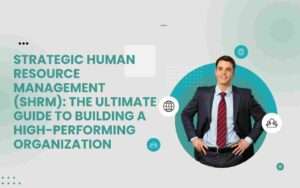Introduction
Financial literacy is not only a competitive advantage but also a need in the rapidly changing global economy of today. A business finance course can revolutionize both your personal and professional lives, regardless of whether you’re an ambitious finance professional, an entrepreneur, or an inquisitive student. But what is Business Finance course all about? We’ll go into great length about the idea, framework, advantages, job options, and worldwide applicability of corporate finance education in 2025 and beyond in this comprehensive guide.
Table of Contents
- What is Business Finance Course?
- Importance of Studying Business Finance
- Core Components of a Business Finance Curriculum
- Types of Business Finance Courses
- Who Should Take a Business Finance Course?
- Skills You Will Learn
- Online vs. Offline Business Finance Courses
- Entry Requirements and Eligibility
- Popular Business Finance Course Providers
- Cost and Duration
- Business Finance Course vs. Accounting Course
- How Business Finance Knowledge Impacts Business Decisions
- Real-World Applications of Business Finance
- Career Opportunities After Completing the Course
- Business Finance in the Context of Small Businesses
- Business Finance and Startups
- Global Recognition of Business Finance Qualifications
- Certifications and Degrees Available
- FAQs About Business Finance Courses
- Final Thoughts
1. What is Business Finance Course?
A Business Finance course is a specialized academic program designed to teach students how to manage financial resources in a business environment. It covers essential areas such as:
- Corporate finance
- Investment analysis
- Financial planning
- Budgeting
- Risk management
- Capital markets
Whether taken at a university level or as part of a professional development program, this course helps individuals and organizations make informed financial decisions.
2. Importance of Studying Business Finance
Understanding business finance equips you with the tools to:
- Analyze financial statements
- Plan strategic budgets
- Evaluate investment opportunities
- Minimize financial risks
- Increase profitability
Businesses that apply financial principles effectively are better able to weather economic challenges and scale operations successfully.
3. Core Components of a Business Finance Curriculum
Most business finance courses consist of the following key modules:
- Financial Accounting
- Managerial Finance
- Corporate Financial Management
- Investment and Portfolio Management
- Financial Risk Analysis
- Capital Budgeting
- International Finance
- Financial Reporting and Analysis
- Strategic Financial Decision-Making
Each of these modules contributes to a holistic understanding of finance in the business context.
4. Types of Business Finance Courses
There are several types of business finance courses available based on educational level and delivery mode:
- Certificate Courses: Short-term programs for beginners.
- Diploma Programs: Offer practical skills with some theory.
- Bachelor’s Degree (BBA in Finance): Undergraduate programs.
- Master’s Degree (MBA in Finance, MSc Finance): For advanced learners.
- Professional Certifications: Like CFA, CPA, ACCA.
- Online Business Finance Courses: Offered by Coursera, edX, Udemy, etc.
5. Who Should Take a Business Finance Course?
This course is ideal for:
- Entrepreneurs and small business owners
- Students of business and economics
- Finance professionals seeking advancement
- Non-finance managers wanting to understand budgets
- Career changers looking to enter the finance field
6. Skills You Will Learn
After completing a business finance course, you will master:
- Analytical thinking
- Financial forecasting
- Cash flow management
- Strategic planning
- Financial modeling using Excel and software like SAP or QuickBooks
- Business valuation techniques
- Economic decision-making
7. Online vs. Offline Business Finance Courses
| Features | Online Courses | Offline Courses |
| Flexibility | High | Low |
| Cost | Relatively low | Higher |
| Networking | Limited (virtual) | Richer (in-person) |
| Resources | Pre-recorded + live support | Real-time access to faculty |
| Certifications | Recognized | Often accredited |
8. Entry Requirements and Eligibility
Requirements vary, but generally include:
- For certificate/diploma courses: SSC/HSC or equivalent.
- Bachelor’s: Higher secondary with commerce/math background.
- Master’s: Bachelor’s in business, economics, or equivalent.
- Professional courses: Prior experience or degree preferred.
English proficiency and mathematical aptitude are often prerequisites.
9. Popular Business Finance Course Providers
Some of the top global institutions offering business finance education include:
- Harvard Business School
- Wharton School, University of Pennsylvania
- London Business School
- University of Oxford
- Stanford University
- Unique Mark Education (Online Programs)
- ACCA Global, CFA Institute
10. Cost and Duration
- Certificates: $50–$300, duration: 1–3 months
- Diplomas: $300–$1000, duration: 6–12 months
- Bachelor’s: $5,000–$25,000, duration: 3–4 years
- Master’s: $10,000–$50,000, duration: 1–2 years
- Professional: CFA/ACCA can cost $1,500–$3,000 over 2–3 years
Many online options offer financial aid or scholarships.
11. Business Finance Course vs. Accounting Course
| Feature | Business Finance | Accounting |
| Focus | Decision-making, strategy | Record-keeping, reporting |
| Tools | Valuation, budgeting, analysis | Ledgers, journals, tax reports |
| Goal | Optimize performance | Ensure accuracy and compliance |
| Career Paths | Financial analyst, CFO | Auditor, Accountant |
12. How Business Finance Knowledge Impacts Business Decisions
Business finance helps answer crucial questions:
- Should we invest in a new project?
- Can we afford to hire more employees?
- What’s our break-even point?
- How do we price our products?
By understanding finance, decision-makers reduce guesswork and increase precision.
13. Real-World Applications of Business Finance
From startups to multinational corporations, business finance principles guide:
- Budget preparation
- Loan applications
- Expansion decisions
- Crisis management (e.g., during COVID-19)
- IPO readiness
- Mergers and acquisitions
14. Career Opportunities After Completing the Course
Graduates can work as:
- Financial Analysts
- Budget Managers
- Investment Bankers
- Risk Managers
- CFOs
- Business Consultants
- Financial Advisors
Finance roles are among the highest-paying globally and are in constant demand.
15. Business Finance in the Context of Small Businesses
For small businesses, understanding business finance means:
- Managing cash flow
- Negotiating better credit terms
- Making tax-efficient decisions
- Avoiding unnecessary loans
- Planning for sustainable growth
16. Business Finance and Startups
Startups benefit from financial knowledge through:
- Fundraising strategies (VCs, angel investors)
- Financial pitch decks
- Profitability forecasting
- Burn rate analysis
- Exit strategy planning
17. Global Recognition of Business Finance Qualifications
Degrees and certifications in business finance are respected in:
- USA
- UK
- Canada
- Australia
- Europe
- Middle East
- Asia-Pacific
This opens up international job markets.
18. Certifications and Degrees Available
Some popular certifications include:
- CFA (Chartered Financial Analyst)
- CPA (Certified Public Accountant)
- ACCA (Association of Chartered Certified Accountants)
- CMA (Certified Management Accountant)
Degrees:
- BBA in Finance
- MBA in Finance
- MSc in Business Finance
19. FAQs About Business Finance Courses
Q: Can I study business finance without a commerce background?
A: Yes, many courses are designed for non-commerce learners with basic math knowledge.
Q: Is business finance hard?
A: It can be challenging but manageable with the right guidance and practice.
Q: Is a finance degree worth it?
A: Absolutely—especially considering the demand for finance professionals.
Q: Which is better: MBA in Finance or CFA?
A: It depends on your career goals. MBA is broad, CFA is specialized.
20. Final Thoughts
So, what is Business Finance course, really?
Making strategic decisions that influence a company’s future is more important than simply calculating figures. Businesses will be led by professionals with excellent financial acumen in 2025 and beyond as they deal with growing unpredictability and competition.
A business finance course can open up a world of potential for anyone, whether they are a professional seeking to advance their skills, a business owner, or a student.
Read More: Accounting and Finance University Ranking: A Comprehensive Guide







